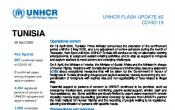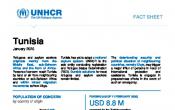Tunisia
Operation: Tunisia
Location
{"longitude":9,"latitude":34,"zoom_level":0,"iso_codes":"'TUN'"}
By clicking on the icons on the map, additional information is displayed.
The boundaries and names shown and the designations used on this map do not imply official endorsement or acceptance by the United Nations.
Key Figures
| 2019 year-end results | |
| 660 | vulnerable refugees and asylum-seekers were accommodated in temporary shelters and received food assistance |
| 400 | vulnerable refugee and asylum-seeker households received multipurpose cash grants |
| 220 | 220 vulnerable refugee and asylum-seeker households received education grants |
| 2020 planning figures |
| 100% | of people of concern will be registered on an individual basis |
| 1,200 | refugees and asylum-seekers will be accommodated in temporary shelters |
| 1,200 | refugee and asylum-seeker households will receive food vouchers |
| 351 | refugee and asylum-seeker households will receive multi-purpose cash grants |
| 192 | refugee and asylum-seeker households will receive conditional cash grants or vouchers for education |
Latest Updates
People of Concern
147%
Increase in
2019
2019
| 2019 | 3,286 |
| 2018 | 1,330 |
| 2017 | 770 |

[["Refugees",1746],["Asylum-seekers",1523],["Others of concern",17]]
Loading ...
Tunisia
< Back
2019
{"categories":[2015,2016,2017,2018,2019,2020],"budget":[6.644560480000001,5.05078387,6.57069731,5.6948431799999994,7.88031062,11.58931922],"expenditure":[3.59359927,3.59924158,4.20083949,4.03289777,6.17532249,null]}
{"categories":[2015,2016,2017,2018,2019,2020],"p1":[6.644560480000001,5.05078387,6.57069731,5.6948431799999994,7.88031062,11.58931922],"p2":[null,null,null,null,null,null],"p3":[null,null,null,null,null,null],"p4":[null,null,null,null,null,null]}
{"categories":[2015,2016,2017,2018,2019,2020],"p1":[3.59359927,3.59924158,4.20083949,4.03289777,6.17532249,null],"p2":[null,null,null,null,null,null],"p3":[null,null,null,null,null,null],"p4":[null,null,null,null,null,null]}
Loading ...
CHOOSE A YEAR
- 2014
- 2015
- 2016
- 2017
- 2018
- 2019
- 2020
Operational context
The protection environment in Tunisia remained generally favorable throughout 2019, despite a sharp increase in new arrivals that challenged both UNHCR’s and the Government’s processing and reception capacities, particularly in the south. The increase in people seeking asylum was strongly linked to the deteriorating security conditions in Libya. Additional resources were put in place by UNHCR to maintain protection activities such as registration, documentation and refugee status determination. UNHCR provided medical assistance and psychosocial support to people experiencing conflict-related trauma. Livelihood support was prioritized for refugees and asylum-seekers to enhance self-reliance and ensure social and economic inclusion within the community.UNHCR advocated with the Government of Tunisia for the adoption of the draft asylum law, and provided trainings and capacity building for lawyers, journalists, parliamentarians and municipalities. Due to the declining security situation in Libya, UNHCR and IOM initiated a collaborative contingency planning process with the Government of Tunisia. Towards the end of 2019, preparedness efforts were accelerated through sectoral meetings among relevant United Nations agencies, NGOs and ministries.
Population trends
The number of people of concern to UNHCR in Tunisia increased threefold, with more than 2,000 refugees and asylum-seekers registered over the course of the year. People of concern arrived in Tunisia as part of mixed movements from Libya by crossing overland, being rescued/intercepted at sea, or (less frequently) by plane.From the beginning of 2019, an increasing trend of arrivals was observed from Libya including nationals from Eritrea, Ethiopia, Somalia and Sudan. Most of the new arrivals were single men between 18 and 59 years old. An estimated 65% of people profiled within mixed movements expressed an intention to seek asylum and were referred to UNHCR, a 25% increase from 2018.
Achievements
- A notable achievement in 2019 was the introduction of the community-based protection model, with a specific focus on case management for extremely vulnerable individuals. Through dedicated trainings by UNHCR partner staff, over 400 people with specific needs benefited from counselling and case management, and nearly 500 received psychosocial support.
- In 2019, reception capacity in southern Tunisia was increased through the establishment of two additional temporary shelters in Zarzis, providing 200 additional beds for vulnerable refugees and asylum-seekers. Recreational activities were conducted by partner staff who also provided counselling services and psychosocial support to nearly 300 individuals hosted in the shelters.
- As a result of UNHCR’s advocacy, refugees with legal work contracts or who were self-employed were included in the national social security system, thereby formalizing their employment.
- UNHCR’s partner, the Arab Institute for Human Rights (AIHR), launched a legal assistance service involving lawyers and judges trained by UNHCR on international protection standards. The service provided legal advice to 400 refugees and asylum-seekers, including representation in court, with ministries and for other public processes.
Unmet needs
- The operation was funded at 72% by the end of 2019.
- An increase in the number of refugees and asylum-seekers hindered UNHCR’s capacity to conduct timely registration and refugee status determination.
- National reception capacities remained overstretched, requiring additional temporary shelter particularly in the north of the country, where an increasing number of vulnerable refugees and asylum-seekers struggled to meet their basic needs.
- As movements to Tunisia increased, further protection monitoring along the borders with Algeria and Libya—as well as in airports—was needed to ensure that those seeking international protection had access to asylum and were properly counselled on their rights.
Operational Environment
The number of refugees in Tunisia is estimated to increase to 1,680 people by the end of 2019, with the majority residing in urban areas. The protection environment for refugees and asylum-seekers in Tunisia is generally stable, and UNHCR cooperates with the authorities in favour of people of concern. UNHCR supports refugees’ access to education, healthcare and livelihoods opportunities.The mixed movements in Tunisia by land and sea are expected to continue in 2019, and UNHCR will continue to coordinate its response through the Mixed Migration Working Group. UNHCR will maintain its protection role, providing emergency shelter and psycho-social support to people of concern at a reception centre, and working in close cooperation with Tunisian authorities, IOM, and partner organizations.
To ensure preparedness in case of further deterioration of the situation in Libya and risk of mass influx, UNHCR will periodically update contingency stock and keep updating the contingency plan, and support the preparedness activities of the authorities.
Key priorities
Considering the need for a national protection framework, in 2019, UNHCR will maintain the following key priorities:- Advocate for adoption of the drafted national asylum law and, through continued capacity-building, support the Tunisian uptake of best practices in the interim.
- Continue profiling, registration and refugee status determination in order to identify people in need of international protection in the context of mixed movements.
- Promote refugee self-reliance through supporting access to livelihoods and to basic services, as well as prioritizing direct assistance to the most vulnerable.
Chiffres clés :
- 400 élèves seront inscrits dans l’enseignement primaire et secondaire du premier cycle
- 400 personnes, notamment des fonctionnaires, des juges, des juristes, du personnel d’organisations partenaires et des membres de la société civile, seront formées aux questions relatives aux réfugiés
- 200 ménages réfugiés recevront des aides en espèces
- 70 personnes relevant de la compétence du HCR suivront une formation sur les connaissances élémentaires en finance, langue et entreprenariat/commerce
- 280 personnes relevant de la compétence du HCR bénéficieront d’un hébergement
- 100 personnes recevront un soutien psychosocial et 260 familles un soutien matériel




















